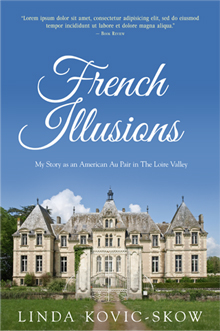My first memoir, French Illusions, My Story as an American Au Pair in the Loire Valley, took me three years and countless hours to complete. During that time, I studied and learned how to write. Of course I also hired editors to finalize the process.
A turning point in my writing occurred when I met a fellow author, MaryKay Windham. She became my mentor and confident. She recommended I take classes from Margie Lawson and my writing improved dramatically. I’m not kidding when I say this. I had no idea how much influence these classes would have on my writing, but it was a monumental change.
 Here are my five best writing tips:
Here are my five best writing tips:
1. It’s old advice, but so important. I strive to “show” readers what a character is doing rather then “tell” them. Both of the following sentences convey the same meaning, but version two is more visceral – more show, than tell.
Instead of “Monsieur Dubois was angry,” I wrote:
“Glaring at his wife, Monsieur Dubois straightened up and turned toward me.”
Instead of “What time will you be home?” he asked, uneasily, I wrote:
“What time will you be home?” he asked, his forehead wrinkled with unease.
2. When I come to the end of a chapter, I try to foreshadow things to come. I want my reader anxious to turn the page to find out what happens next. The following excerpt comes at the end of chapter 3 in my memoir. Who doesn’t want to know more about upcoming friendships and romance?
“Tapping the pamphlet against my lower lip, I pondered the differences between a larger more exciting city versus a smaller, quaint rural town. Both of them appealed to me on different levels. Songais offered me the opportunity to connect with the Dubois’s family, their relations, and townspeople on a personal level. Tours, on the other hand, presented prospects for friendships and romance while I studied French at the university.
My mouth slid into a subtle smile. I didn’t have to choose. I could have both. The possibilities were endless.”
3. Descriptions have their place, but I’ve always loved “white space” on a page, so I dialog a scene whenever possible. Actually, almost always. Think about it, when you read a book, do you look forward to conversations rather then descriptions that go on and on?
4. Visceral reactions, scattered throughout a book, adds depth. “Pulses race” and “guts tighten” when people get excited, frightened or angry.
Madame Dubois motioned us forward with her arm and we climbed the steps, stopping to rest on the first landing. When we reached the second, my stomach lurched as she grabbed the railing with one hand and her belly with the other.
My throat constricted at the sound of his voice. “No, not at all, I’m so glad you called. How are you?”
4. Internalizations, occur when characters talk to themselves inside their minds. It adds a personal touch to scenes.
For a moment, I was speechless, thinking: How many times has she told me this already? She was treating me like an irresponsible teenager and it was unjustified. “I’ve been very careful, so maybe there’s another explanation?” I said, struggling to keep my voice from cracking.
Perhaps you have a few writing tips of your own to share? I would love to hear them. If you would like to read more about my experiences in France, you can purchase my eBook or paperback at Amazon by clicking on this link, French Illusions, My Story as an American Au Pair in the Loire Valley The audiobook version is also available at Audible.com.

Speak Your Mind